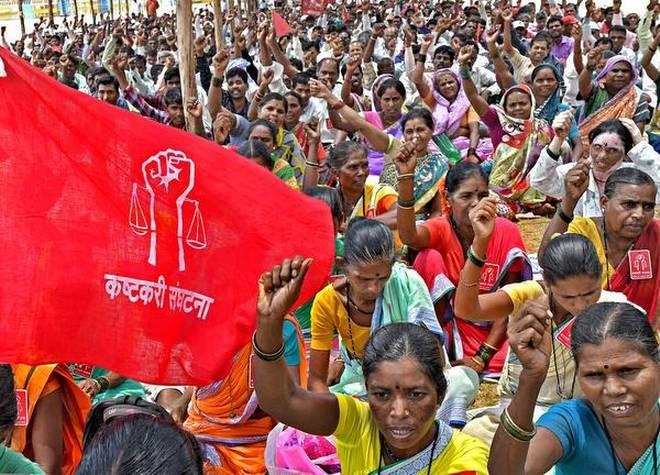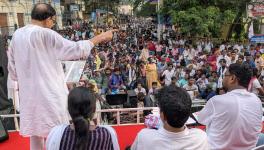Farmers In Maharashtra Protest Against Forceful Land Acquisition For Bullet Train Project

Image Courtesy: The Hindu
On 17 May, nearly 1,000 tribal farmers held a protest at Mumbai’s Azad Maidan against the ongoing forceful land acquisition by the BJP government in Maharashtra for the Ahmedabad-Mumbai Bullet Train project.
Organised under the Bhumi Adhikar Andolan, the protest had farmers from Raigad, Thane, Nashik, Vidarbha, Konkan, Palghar, Dhule, Jalgaon, Dahanu, Gadchiroli and Nandurbar.
The farmers are demanding that the government repeal a notification issued by the Maharashtra governor in November 2017, which diluted the role of gram sabhas in infrastructure projects.
The joint India-Japan bullet train project requires nearly 1,400 hectares of land in Gujarat, Maharashtra and Dadra and Nagar Haveli. The total cost of the project is estimated to be Rs 1.08 lakh crore, of which Rs 88,000 crore will be a soft loan from the Japan International Cooperation Agency (JICA).
The proposed high-speed railway corridor is 508.17 km in length, of which 155.642 km falls in Maharashtra, 350.530 km in Gujarat and 2 km in the Union Territory of Dadra and Nagar Haveli.
The government is prepared to acquire 850 hectares of land from Gujarat and 353 hectares from Maharashtra for the project.
The Azad Maidan protest on 17 May is the latest among the protests and the resistance by farmers against the extravagant project.
In April, farmers in Gujarat’s Vadodara had protested at a “stakeholder consultation meet” held by the National High Speed Rail Corporation (NHSRC), the special-purpose vehicle executing the project. The farmers opposed the high-handedness of the NHSRC while dealing with the farmers affected by the land acquisition. In Maharashtra’s Thane and Phalgar districts, farmers are arguing that the NHSRC officials are conducting surveys of their land without considering their consent, despite the regional gram sabhas unanimously declining to give away land for the project. Thane farmers who protested against the land survey were reportedly arrested earlier this month.
Notification diluting the role of gram sabhas
On 14 November, 2017, Maharashtra governor C Vidyasagar Rao issued a notification, according to which the gram sabha’s consent is no longer required for the purchase of tribal-owned land by the state government for “vital” public projects. This notification had taken away the tribal land rights provided under the Panchayats (Extension to Scheduled Areas) Act (PESA), 1996, which ensures self-governance through gram sabhas for people living in the Scheduled Areas in India.
The notification will also impact the rights of the affected farmers due to the Mumbai-Nagpur Super Expressway project that is underway.
Farmers, along with representatives of the Bhumi Adhikar Andolan, have sent a letter on 17 May to C Vidyasagar Rao, demanding that he repeal this notification.
Double displacement
Earlier in May, farmers in Dahanu taluka, Phalgar district, farmers stopped officials from conducting a survey of the land. They did not want to get displaced for the second time, said the villagers. Raghunath Sutar, a resident of a village in Dahanu, told a newspaper that the locals were already victims of a dam project. He said residents had been displaced to two villages in Dahanu. “Now they will be displaced again for the bullet train. Is that fair?” asked Sutar.
Get the latest reports & analysis with people's perspective on Protests, movements & deep analytical videos, discussions of the current affairs in your Telegram app. Subscribe to NewsClick's Telegram channel & get Real-Time updates on stories, as they get published on our website.
























